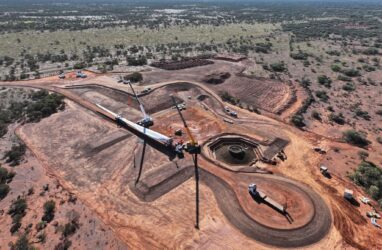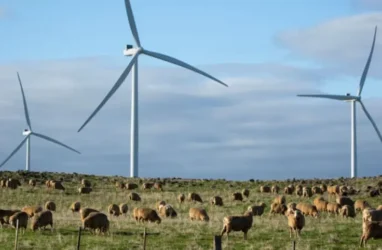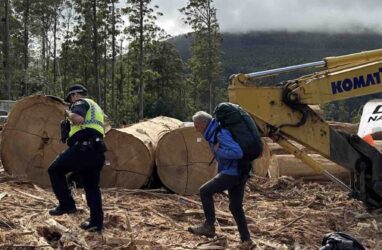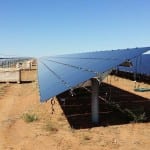Feed aggregator
Governments lock in $140m for potential 5GW Pilbara green hydrogen hub
The post Governments lock in $140m for potential 5GW Pilbara green hydrogen hub appeared first on RenewEconomy.
Scientists shocked to discover new species of green anaconda, the world’s biggest snake
Right to roam countryside 'closed off' to walkers
AEMO says wind farm responded “as designed” in Victoria storms as conservatives pile into renewables
The post AEMO says wind farm responded “as designed” in Victoria storms as conservatives pile into renewables appeared first on RenewEconomy.
Works begin on giant Queensland Tesla battery at site of former coal plant
The post Works begin on giant Queensland Tesla battery at site of former coal plant appeared first on RenewEconomy.
Bob Brown arrested at protest defending Tasmania’s giant trees
The post Bob Brown arrested at protest defending Tasmania’s giant trees appeared first on RenewEconomy.
Blades for wind project at remote gold mine arrive after 850km journey
 Giant blades complete might be the longest travelled by wind turbines parts in Australia to date.
Giant blades complete might be the longest travelled by wind turbines parts in Australia to date.
The post Blades for wind project at remote gold mine arrive after 850km journey appeared first on RenewEconomy.
PREVIEW: Upcoming Supreme Court case could stifle US federal environmental efforts, experts say
Weak EU demand for electric vehicles due to high prices, not the other way around, says campaign group
Concrete pours and modules arrive for South Australia’s biggest battery storage project
The post Concrete pours and modules arrive for South Australia’s biggest battery storage project appeared first on RenewEconomy.
As the world heats up, solar panels will degrade faster. What can we do?
The post As the world heats up, solar panels will degrade faster. What can we do? appeared first on RenewEconomy.
‘Green’ or ‘blue’ hydrogen – what difference does it make? Not much for most Australians
The Guardian view on festivals and the future: bound together by the power of a shared vision | Editorial
We need international gatherings if we are to find a common language to resist environmental destruction
In the autumn of 1945, the Scotsman newspaper reported excitedly on an ambitious project to establish Edinburgh as a world centre for music and drama. It would host the first great postwar international art assembly in Europe, with a mission to celebrate the “flowering of the human spirit”. Two years later, the Edinburgh international festival was born.
Seven decades on, that flowering might sometimes appear overabundant. Scotland alone has 18 book festivals this year, while the Association of Festival Organisers, which is currently updating a survey from 2022, estimates that, despite a ripple of post-Covid closures, there will as many as 900 music jamborees across the UK. Faced with the double whammy of shrinking incomes and vanishing subsidies, prices have risen and audiences have aged, while organisers face an annual scramble to fill gaping holes in their budgets that yawn wider the more brave and imaginative they are. Meanwhile, the search for alternative sources of funding, either from business or from overseas, has been repeatedly complicated by ethical issues.
Continue reading...UN wildlife summit expands species protection list, agrees strategic plan
Trampling Victoria's Alps: how brumbies are destroying the native habitat – video
At Native Cat Flat in Victoria’s Alpine national park, four fenced-off areas show a strikingly different ecology, highlighting the damage wrought by more than 2,700 feral horses in the area. Behind the fences, lush sphagnum, dense vegetation, grass tussocks, shrubs and herbs thrive. Outside the plots, the ground is pockmarked with deep hoofprints, and the native grasses are overgrazed, exposing endangered animals in the area — which rely on dense vegetation — to predators
‘Feral horses don’t know state borders’: the push to protect Victoria’s Alpine national park
From beehive to kitchen table: UK beekeepers call for new law to trace honey’s origin
British producers to back EU’s proposed regulations to stop trade in adulterated honey
Britain’s beekeepers are backing proposed new rules to combat fraud in the supply chain, ensuring a jar of honey can be traced on its journey of up to 5,000 miles from the beehive to the shop shelf.
The European parliament has agreed new labelling rules and a project to establish a traceability system for honey from harvesting to the consumer. The proposed rules are part of an overhaul of the “breakfast directives”, including the honey directive.
Continue reading...Very cool: trees stalling effects of global heating in eastern US, study finds
Vast reforestation a major reason for ‘warming hole’ across parts of US where temperatures have flatlined or cooled
Trees provide innumerable benefits to the world, from food to shelter to oxygen, but researchers have now found their dramatic rebound in the eastern US has delivered a further, stunning feat – the curtailing of the soaring temperatures caused by the climate crisis.
While the US, like the rest of the world, has heated up since industrial times due to the burning of fossil fuels, scientists have long been puzzled by a so-called “warming hole” over parts of the US south-east where temperatures have flatlined, or even cooled, despite the unmistakable broader warming trend.
Continue reading...February on course to break unprecedented number of heat records
Rapid ocean warming and unusually hot winter days recorded as human-made global heating combines with El Niño
February is on course to break a record number of heat records, meteorologists say, as human-made global heating and the natural El Niño climate pattern drive up temperatures on land and oceans around the world.
A little over halfway into the shortest month of the year, the heating spike has become so pronounced that climate charts are entering new territory, particularly for sea-surface temperatures that have persisted and accelerated to the point where expert observers are struggling to explain how the change is happening.
Continue reading...








